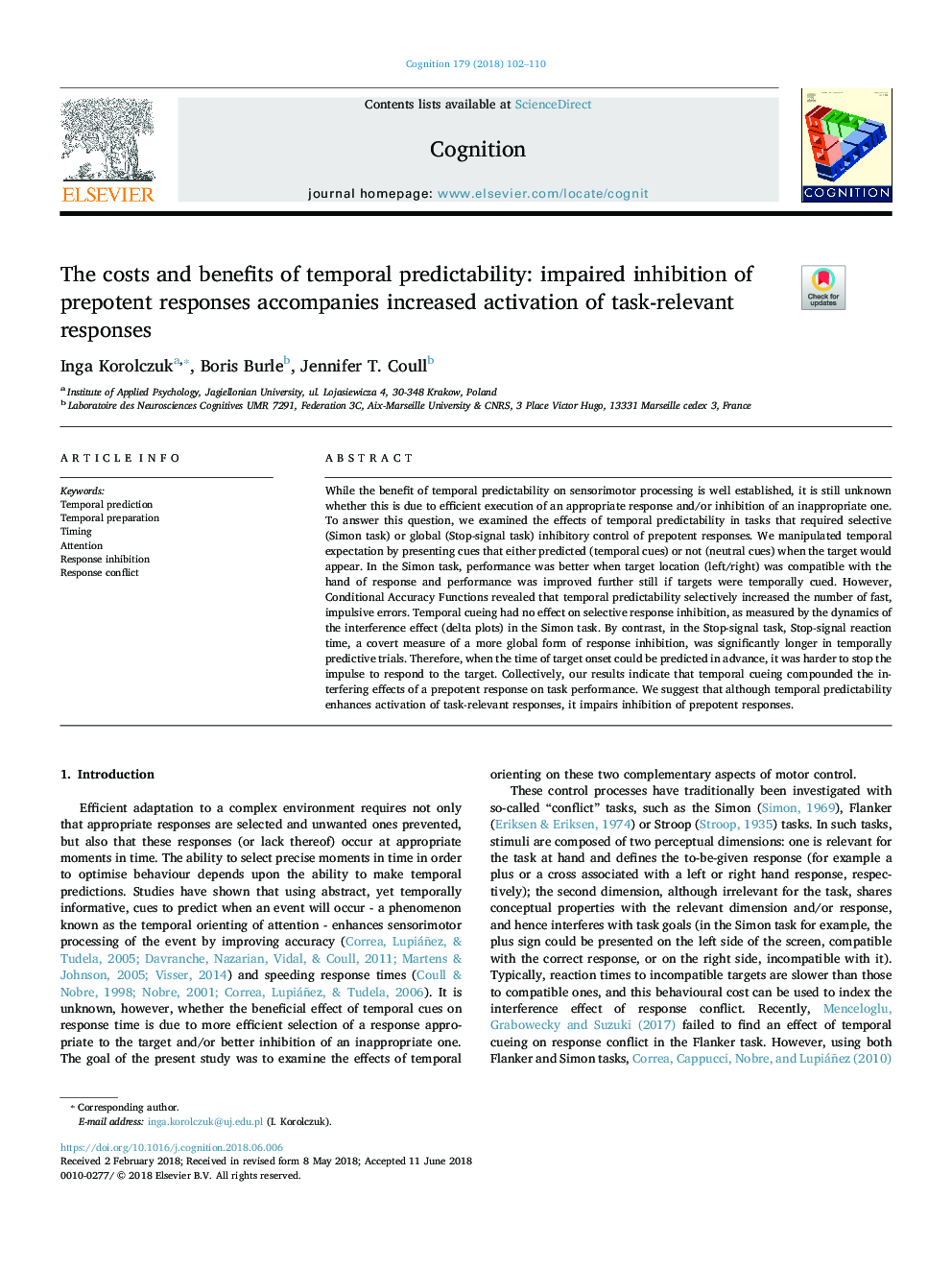| کد مقاله | کد نشریه | سال انتشار | مقاله انگلیسی | نسخه تمام متن |
|---|---|---|---|---|
| 7285140 | 1474088 | 2018 | 9 صفحه PDF | دانلود رایگان |
عنوان انگلیسی مقاله ISI
The costs and benefits of temporal predictability: impaired inhibition of prepotent responses accompanies increased activation of task-relevant responses
ترجمه فارسی عنوان
هزینه ها و مزایای پیش بینی زمانی: اختلال در مهار پاسخ های پیشین همراه با افزایش فعال بودن پاسخ های مرتبط با کار
دانلود مقاله + سفارش ترجمه
دانلود مقاله ISI انگلیسی
رایگان برای ایرانیان
کلمات کلیدی
پیش بینی موقتی آماده سازی موقتی زمان سنجی، توجه مهار پاسخ درگیری واکنش
ترجمه چکیده
در حالی که مزایای پیش بینی زمانی در پردازش سنسور حرکتی به خوبی شناخته شده است، هنوز معلوم نیست که آیا این به دلیل اجرای کارآمد پاسخ مناسب و یا مهار یک نامناسب است. برای پاسخ به این سوال، اثرات پیش بینی زمانی را در وظایفی که نیاز به انتخاب بازدارنده (وظیفه سیمون) یا کنترل جهانی مانع از واکنشهای پیشگیرانه داشت، مورد بررسی قرار دادیم. ما انتظارات زمانی را با ارائه نشانه هایی که یا پیش بینی (نشانه های زمانی) یا نه (نشانه های خنثی) زمانی که هدف ظاهر می شود، دستکاری کردیم. در وظیفه سیمون، عملکرد زمانی بهتر بود که موقعیت هدف (سمت چپ / راست) با دست پاسخ و سازگاری با عملکرد هماهنگ بود، اگر اهداف به طور موقت در نظر گرفته شوند، بهبود یافت. با این حال، توابع دقیق قاعده نشان داد که پیش بینی های زمانی به طور انتخابی تعداد خطاهای سریع و مداخله ای را افزایش داد. با استفاده از دینامیک اثر تداخل (قطعه دلتا) در وظیفه سیمون، تأخیر زمانی بر روی مهار بازخورد انتخابی تأثیری نداشت. در مقابل، در زمان پاسخ سیگنال توقف، زمان واکنش سیگنال توقف، اندازه گیری مخفی از یک فرم جهانی واکنش پاسخ، به طور معنی داری طولانی تر در آزمایشات پیش بینی شده بود. بنابراین، زمانی که زمان شروع هدف را می توان پیش بینی کرد، سخت تر بود که مانع پاسخ به هدف شود. به طور خلاصه، نتایج ما نشان می دهد که تغییرات زمانی، اثرات تداخل پاسخ های پیشین را در عملکرد وظیفه ترکیب می کند. ما پیشنهاد می کنیم که هرچند پیش بینی های زمانی، فعال شدن پاسخ های مربوط به کار را تقویت می کند، مهار واکنش های پر قدرت را مختل می کند.
موضوعات مرتبط
علوم زیستی و بیوفناوری
علم عصب شناسی
علوم اعصاب شناختی
چکیده انگلیسی
While the benefit of temporal predictability on sensorimotor processing is well established, it is still unknown whether this is due to efficient execution of an appropriate response and/or inhibition of an inappropriate one. To answer this question, we examined the effects of temporal predictability in tasks that required selective (Simon task) or global (Stop-signal task) inhibitory control of prepotent responses. We manipulated temporal expectation by presenting cues that either predicted (temporal cues) or not (neutral cues) when the target would appear. In the Simon task, performance was better when target location (left/right) was compatible with the hand of response and performance was improved further still if targets were temporally cued. However, Conditional Accuracy Functions revealed that temporal predictability selectively increased the number of fast, impulsive errors. Temporal cueing had no effect on selective response inhibition, as measured by the dynamics of the interference effect (delta plots) in the Simon task. By contrast, in the Stop-signal task, Stop-signal reaction time, a covert measure of a more global form of response inhibition, was significantly longer in temporally predictive trials. Therefore, when the time of target onset could be predicted in advance, it was harder to stop the impulse to respond to the target. Collectively, our results indicate that temporal cueing compounded the interfering effects of a prepotent response on task performance. We suggest that although temporal predictability enhances activation of task-relevant responses, it impairs inhibition of prepotent responses.
ناشر
Database: Elsevier - ScienceDirect (ساینس دایرکت)
Journal: Cognition - Volume 179, October 2018, Pages 102-110
Journal: Cognition - Volume 179, October 2018, Pages 102-110
نویسندگان
Inga Korolczuk, Boris Burle, Jennifer T. Coull,
